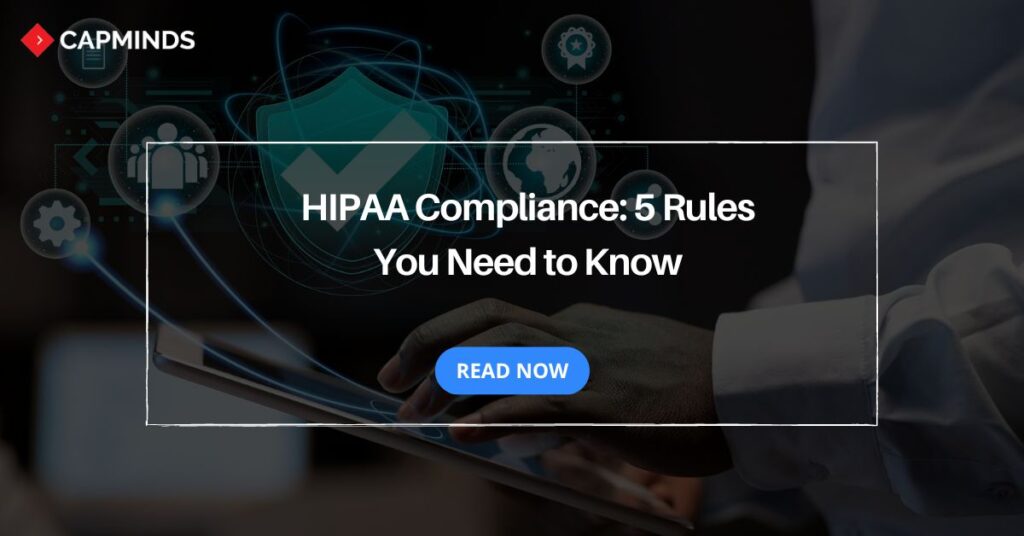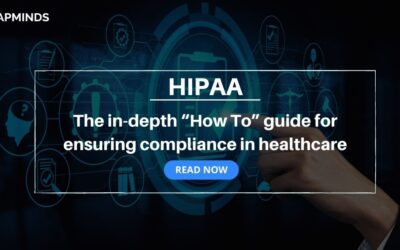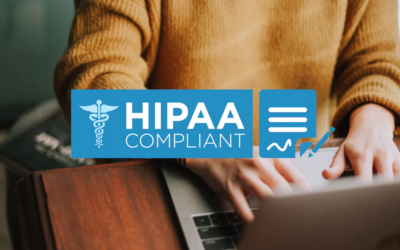HIPAA Compliance: 5 Rules You Need to Know
When it comes to digitalized healthcare solutions, ensuring patient privacy is critical. The United States government established HIPAA (Health Insurance Portability and Accountability Act).
HIPAA establishes privacy and security standards for properly handling and securing sensitive medical data. HIPAA compliance is not only legally mandatory but also the right thing to do. Patients must believe that they can trust their healthcare experts and practices with their health information.
Getting HIPAA Compliance correctly builds trust. So, it is required for Healthcare practitioners to have a thorough awareness of the HIPAA Compliance Rules.
In this blog post, we will have a closer look at the 5 HIPAA Compliance privacy, security, audit log, and other rules that you should know about.
What is HIPAA Compliance?
The acronym for HIPAA Compliance stands for Health Insurance Portability and Accountability Act. It is a US law that ensures the privacy and security of patient medical records.
HIPAA compliance is adhering to tight laws governing how healthcare providers, health plans, and others handle sensitive patient information.
- Protecting sensitive health information such as medical records, test findings, and billing data.
- Controlling who can access PHI (Protected Health Information).
- Implementing appropriate methods for using, storing, and disposing of PHI.
Under HIPAA, there are several requirements for utilizing, sharing, storing, and disposing of protected data. Healthcare organizations that deal with PHI must maintain strong safeguards and access restrictions to avoid penalties and data breaches.
Related: HIPAA: The In-Depth “How To” Guide For Ensuring Compliance In Healthcare
Protected Health Information: What You Need to Know
For a better understanding of HIPAA complaints, you must first understand Protected Health Information (PHI). The United States Department of Health and Human Services defines Protected Health Information (PHI) as any information about an individual’s health status, medical conditions, healthcare services received, or healthcare payment details.
This comprises information in any media, such as electronic, paper, or spoken. For example, medical records, test results, doctor’s notes, bills, and patient images or videos are all deemed private and confidential.
Healthcare providers and organizations should be compelled by law to protect PHI and prevent unauthorized access or disclosure. Only those directly involved in patient treatment or health insurance processing have permission to access PHI without approval.
5 HIPAA Compliance Privacy and Security Rules
As a healthcare provider or organization, understanding these HIPAA Compliance rules is crucial to handling PHI. These rules will ensure that the protected health information is secure from unauthorized access to maintain its confidentiality.
1. Privacy Rule
The privacy rule sets clear guidelines on how patient health information can be used and shared by healthcare providers, health plans, and others. It ensures that patient medical records and sensitive information remain private and confidential.
Only those who are directly involved in patient care or handling billing can access patient details without patient permission. This rule is set to maintain the privacy rights of a patient.
2. Security Rule
The Security rule focuses on keeping electronic health records safe and secure. Healthcare organizations must follow strict security measures to prevent unauthorized access or loss of digital health data of patients. This includes:
- Using secure computer systems
- Controlling who can view patient records
- Protecting data transmissions
The goal of security rule is to maintain the confidentiality, integrity, and availability of patient’s electronic health information.
3. Audit Log Rule
Under the audit log rule, healthcare providers must keep a detailed log or audit trail of every instance when patient medical records are accessed, modified, or shared with others. It is required for healthcare organizations to maintain the audit logs for 6 years.
This allows them to monitor activity and investigate any potential privacy breaches or misuse of patient personal health data. This audit log rule promotes transparency and accountability in handling sensitive information.
4. Breach Notification Rule
This rule applies when there is a breach where the patient’s health details are improperly accessed or disclosed, the healthcare organization must notify the patient promptly. Depending on the severity, they may also need to alert the government and media.
Swift notification allows patients to take steps to protect themselves from potential harm caused by the unauthorized exposure of personal medical data.
5. Individuals’ Right to PHI Access
Individuals’ Right to PHI Access Rule empowers patients to view and get copies of medical records with help from doctors, hospitals, or health insurance companies.
Patients have the right to inspect these details about the medical conditions, treatment, and billing. Getting access to patient information promotes openness and allows you to make well-informed care decisions.
Related: HIPAA Compliant EHR: All You Need To Know
CapMinds Health IT Compliance Solution For Your Practice
Complying with crucial privacy standards like HIPAA is a no-way-out “diamond” rule for entities in the healthcare spectrum. Getting help from health tech experts like CapMinds is the only solution to get things done with full compliance at lower costs.
At CapMinds you can find the perfect high-end, all-in-one Interoperability solutions to meet your requirements. Utilizing CapMinds Heath IT Compliance solution, your practice can:
- Improve the quality of care by adhering to HIPAA and other industry laws.
- Protect your patients’ privacy and interests using national regulations such as the HIPAA Privacy and Security Rule.
- Our compliance services are secure and standardized under official standards, eliminating the risk of breaching confidentiality and losing health data.
- CapMinds health-IT compliance protects patient information from potential threats.
- Our compliance in medical services will ensure delivering well-protected, quality, and safe patient care, along with HIPAA.
- Utilise advances to keep medical records secure while also making them available for integration across authorized platforms.
Our HIPAA-compliant HL7 FHIR standards enhance your organizational processes to make them easier. With our smartest, HIPAA-compliance, and safest cloud-security services you can get across a variety of online healthcare platforms.
Reach out to CapMinds for a Comprehensive Health IT Compliance Solution for Your Practice


